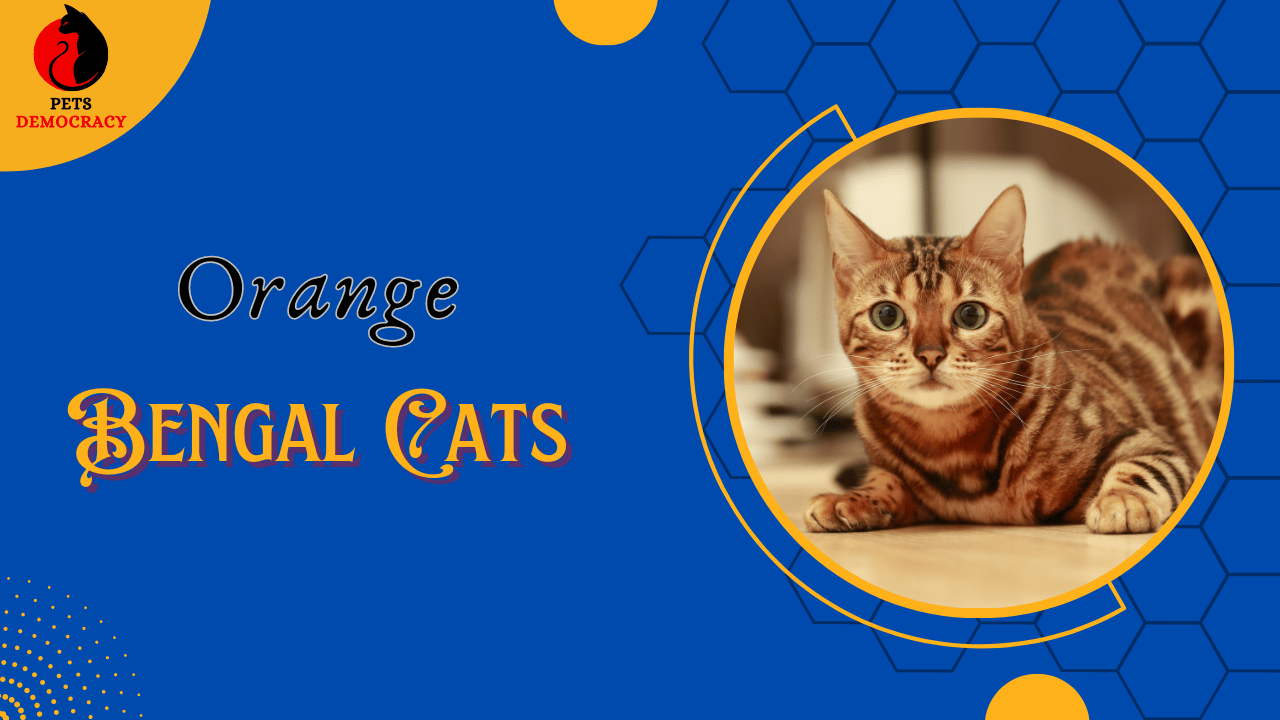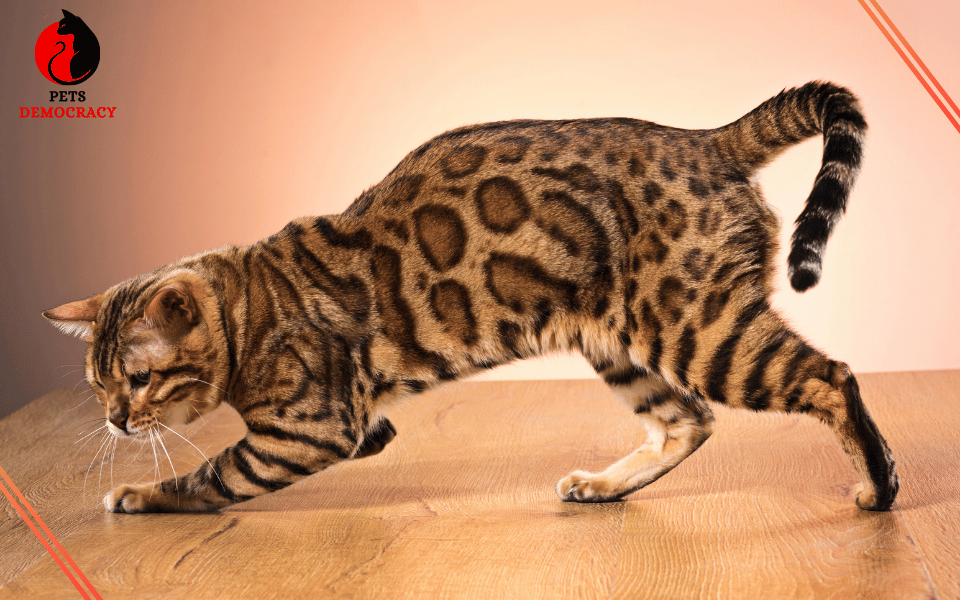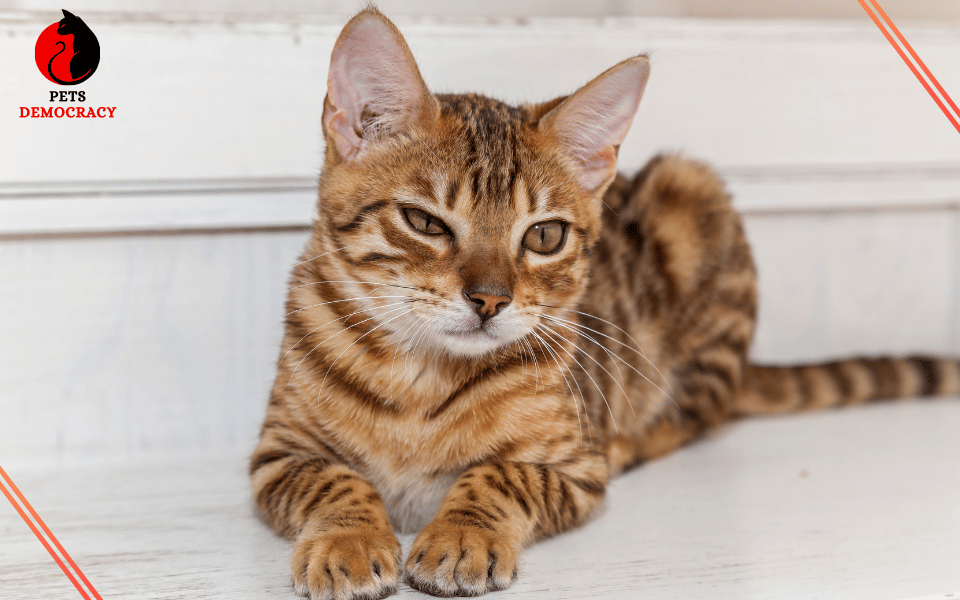
In this article, we’ll explore the personality traits of Orange Bengal cats, suggest some popular names, and provide essential care tips to ensure your furry friend remains happy and healthy.
Orange Bengal cats, with their strikingly beautiful coats and dynamic personalities, have captured the hearts of cat lovers worldwide.
These felines are not only visually stunning but also possess unique characteristics that set them apart from other breeds.
The Unique Appearance of Orange Bengal Cats
One of the first things that attracts people to Orange Bengal cats is their mesmerizing coats. These cats boast a vibrant orange hue, often with contrasting spots or marbling that resembles that of a wild leopard.
The sleek, short coat of Orange Bengal cats not only looks stunning but also feels incredibly soft to the touch. Their muscular build, paired with a graceful stride, makes them a sight to behold.
Orange Bengal Cats Personality Traits

Playful and Energetic Nature
Orange Bengal cats are known for their high energy levels and playful nature. They love to engage in interactive play, whether it’s chasing after a toy or climbing cat trees.
This playful behavior is a hallmark of their personality, making them an excellent choice for families who enjoy an active pet.
Intelligence and Curiosity
The intelligence of Orange Bengal cats is truly remarkable. They are quick learners and can be trained to perform various tricks and commands.
Their curiosity often leads them to explore their surroundings, making them adventurous companions. Providing mental stimulation through puzzle toys or interactive play can help keep their intelligent minds engaged.
Affectionate and Social
Despite their wild appearance, Orange Bengal cats are incredibly affectionate and social. They like taking part in family events and developing close relationships with their human companions.
Their social nature also means they get along well with other pets, making them a great addition to multi-pet households.
Orange Bengal Cat Names
Choosing the perfect name for your Orange Bengal cat can be a fun yet challenging task. Here are some popular names that capture the essence of these beautiful felines:
Orange Bengal Cats Names for Males
- Simba – Inspired by the lion king, perfect for a regal and strong cat.
- Tiger – Highlighting the wild and fierce look of your cat.
- Copper – Reflecting the rich orange hue of their coat.
- Leo – Short for leopard, emphasizing their wild appearance.
- Rusty – A playful nod to their vibrant color.
Orange Bengal Cats Names for Females
- Ginger – A cute and fitting name for an orange-hued cat.
- Cleo – Short for Cleopatra, perfect for a queen-like feline.
- Amber – Inspired by the warm, golden tones of their coat.
- Saffron – A unique name reflecting the rich orange color.
- Tawny – A beautiful name that complements their stunning coat.
Caring for Your Orange Bengal Cat
Diet and Nutrition
Proper diet and nutrition are crucial for the overall health of Orange Bengal cats, These cats thrive on a high-protein diet, which helps maintain their muscular build and energy levels.
Select premium cat food with meat listed as the main ingredient, Additionally, providing a mix of wet and dry food can help ensure they receive the necessary hydration and nutrients.
Grooming Needs
Although Orange Bengal cats have short coats, regular grooming is essential to keep their fur in top condition.
Brushing your cat once a week can help reduce shedding and keep their coat shiny and smooth. Additionally, regular grooming sessions provide an opportunity to check for any skin issues or parasites.
Exercise and Mental Stimulation
Given their energetic and curious nature, Orange Bengal cats require ample physical and mental stimulation.
Interactive toys, climbing structures, and regular play sessions can help keep them engaged and prevent boredom.
Mental stimulation, such as puzzle feeders or training sessions, is equally important to keep their intelligent minds sharp.
Health and Wellness
Regular veterinary check-ups are essential to ensure the health and wellness of your Orange Bengal cat. Routine vaccinations, dental care, and parasite prevention are crucial aspects of their healthcare regimen.
Additionally, being aware of breed-specific health issues, such as hypertrophic cardiomyopathy (HCM), can help you take proactive measures to maintain your health.
Creating a Safe Environment
Creating a safe and enriching environment for your Orange Bengal cat is vital for their well-being. Ensure that your home is cat-proofed, removing any potential hazards such as toxic plants or small objects they could swallow.
Providing a variety of safe and engaging toys, as well as designated scratching posts, can help satisfy their natural instincts.
Training and Socialization of Orange Bengal Cats

Early Socialization
Socializing your Orange Bengal cat from a young age is essential to ensure they grow up to be well-adjusted and confident adults.
Expose them to various environments, sounds, and people to help them become comfortable in different situations. Positive reinforcement techniques, such as treats and praise, can help reinforce good behavior during socialization.
Basic Training Commands
Training your Orange Bengal cat can be a rewarding experience for both you and your feline friend. Start with basic commands such as “sit,” “stay,” and “come.”
Use positive reinforcement and consistency to encourage desired behaviors. Training sessions should be short and engaging to keep their attention focused.
Litter Box Training
Most Orange Bengal cats are quick learners when it comes to litter box training. Provide a clean and easily accessible litter box, and place your cat in it after meals or naps to encourage use.
Common Health Concerns in Orange Bengal Cats
Hypertrophic Cardiomyopathy (HCM)
Hypertrophic cardiomyopathy is a common heart condition in Bengal cats. Regular veterinary check-ups and early detection through echocardiograms can help manage this condition effectively. Maintaining a healthy weight and providing a balanced diet can also reduce the risk of HCM.
Dental Issues
Dental health is crucial for Orange Bengal cats, as they are prone to periodontal disease. Regular dental check-ups, brushing their teeth, and providing dental treats can help maintain good oral hygiene and prevent dental issues.
Allergies and Skin Conditions
Some Orange Bengal cats may develop allergies or skin conditions. Regular grooming, a healthy diet, and maintaining a clean environment can help reduce the risk of these issues.
If you notice any signs of allergies or skin problems, consult your veterinarian for appropriate treatment.
FAQs
Do Orange Bengal cats get along with other pets?
Yes, Orange Bengal cats are social and generally get along well with other pets.
How much exercise does an Orange Bengal cat need?
They require regular physical and mental stimulation, including interactive play and climbing structures.
What type of diet is best for Orange Bengal cats?
A high-protein diet with high-quality cat food that lists meat as the primary ingredient is ideal.
Conclusion
Orange Bengal cats are truly a remarkable breed, combining stunning looks with a dynamic and affectionate personality.
By understanding their unique needs and providing the necessary care, you can ensure a happy and healthy life for your feline companion.
Whether it’s choosing the perfect name, providing proper nutrition, or ensuring regular veterinary care, every aspect of caring for your Orange Bengal cat contributes to their overall well-being.


